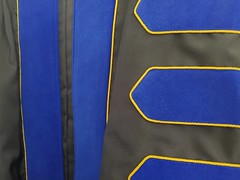 2021. Just the sheer mention of the year makes me squirm at this point. In the words of the Grateful Dead, “what a long strange trip it’s been”. Just when you thought that 2020 taught us how to deal with a pandemic, 2021 made an appearance and challenged that assertion. However, as I am often reminded, when life gives you lemons, make lemonade. Or, in my case, when life gives you a pandemic, write a PhD dissertation.
2021. Just the sheer mention of the year makes me squirm at this point. In the words of the Grateful Dead, “what a long strange trip it’s been”. Just when you thought that 2020 taught us how to deal with a pandemic, 2021 made an appearance and challenged that assertion. However, as I am often reminded, when life gives you lemons, make lemonade. Or, in my case, when life gives you a pandemic, write a PhD dissertation.
Let me start by saying that I would never wish a pandemic upon anyone. In March 2020, the world as we know it was sent spinning by COVID-19. The pandemic brought with it lifestyle changes, lockdowns, masks, and social distancing. Teaching in a classroom became remote learning at the flip of a switch. Many were faced with the loss of friends, family, or colleagues due to the ravages of COVID-19. Worse yet, we continue to struggle with this pandemic, and its impact, on so many disturbing levels to this day.
None of us ever expected that something like this would happen in our lifetimes because, well, it hasn’t. Frankly, I think that my generation and those that have followed have been relatively insulated from global concerns over the past 30 to 40 years. At least that’s the narrative we have told ourselves.
The biggest struggle has truly been the change in mindset that all of this has demanded.
A pandemic forces you to reevaluate what is truly important in life, what is just a distraction, and what does - or doesn’t - truly add value to your world. Guess what? A PhD dissertation forces you to do the same thing.
At the time of my last post on these pages, I was in the midst of pandemic and dissertation angst. Everything was a bit of a blur, to be honest. There was a lot of reading and writing and several long Thoreau-esque walks for inspiration and clarity. Meanwhile, the pandemic raged on around me. My days became pretty simple: teaching, writing, eating, sleeping, and exercising. Lather, rinse, repeat. This strange timing, one which I could not have planned for, became lemonade soon enough.
I never thought that I’d be presented with the task of completing a PhD dissertation in a pandemic. But in the end, having the time to focus was all a blessing in disguise. I can say that now, though I doubt I would have said it along the way as I struggled, as many have, with solitude and isolation and just the lack of any semblance of normalcy. I was reminded of the things I truly love in life and how vivid my existence is when they are present; however, the counterpoint was how many things were found to not impact my world in their absence.
What is often forgotten is how much we can be distracted by life around us. We forget how much time we waste on things that really aren’t impacting the quality of our lives. We end up with a bloated existence of things we think we need to survive - when in fact, they are just add-ons that don’t lend much value-added benefit. We become so immersed in the worlds of others that we forget about our own internal milieu. We lose sight of working within the confines of ourselves while continually pushing the envelope to expand those boundaries. A pandemic forces you to face all of these things - or at least it provides you with the golden opportunity to do so.
I seriously thought that by the time the pandemic was receding, I would be emerging from dissertation angst. I was wrong. The pandemic outlasted my PhD studies. Now, I have a PhD in Education with a specialization in Learning, Instruction, and Innovation. My dissertation, entitled “Data Modeling of Cognitive Structure in Physiotherapy Students Learning Gross Anatomy”, was a preliminary examination of how physiotherapy students learning gross anatomy organize their knowledge. It is just the start of many scholarly projects ahead in what is admittedly a very narrow window of research and expertise.
A PhD was never a part of my original professional development. Nor was a pandemic, to be honest. And I certainly didn’t envision both happening simultaneously. But much was learned, and I emerged not only with academic credentials but a much better understanding of what truly matters in life - and, thankfully, what doesn’t. Maybe normal should have never truly been normal in the first place. Thoughts on that to follow …
Photo credits: Allan Besselink
 "Running Injuries: Etiology And Recovery- Based Treatment" (co-author Bridget Clark, PT) appears in the third edition and fourth editions of "Clinical Orthopaedic Rehabilitation: A Team Approach" by Charles Giangarra, MD and Robert C. Manske, PT.
"Running Injuries: Etiology And Recovery- Based Treatment" (co-author Bridget Clark, PT) appears in the third edition and fourth editions of "Clinical Orthopaedic Rehabilitation: A Team Approach" by Charles Giangarra, MD and Robert C. Manske, PT.
 Allan Besselink, PT, DPT, Ph.D., Dip.MDT has a unique voice in the world of sports, education, and health care. Read more about Allan here.
Allan Besselink, PT, DPT, Ph.D., Dip.MDT has a unique voice in the world of sports, education, and health care. Read more about Allan here.
 Top 5 finalist in three categories: "Best Overall Blog", "Best PT Blog" and "Best Advocacy Blog".
Top 5 finalist in three categories: "Best Overall Blog", "Best PT Blog" and "Best Advocacy Blog".